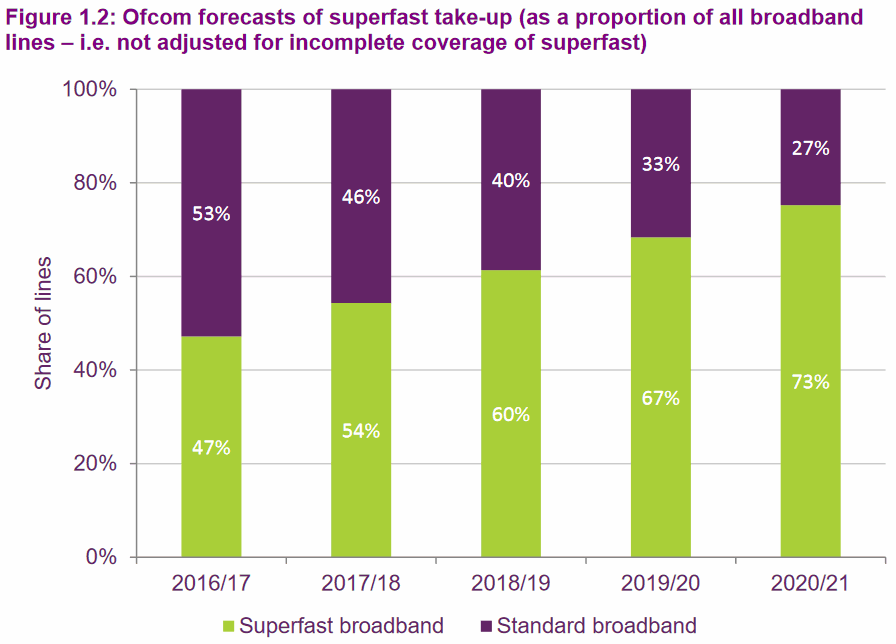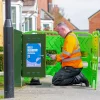UPD Ofcom Start Battle Over the Price of BT 40Mbps UK Fibre Broadband Lines
The price that ISPs and consumers pay for access to a 40Mbps FTTC superfast broadband line on Openreach’s (BT) network in the United Kingdom is set to fall after the telecoms regulator, Ofcom, launched a new review of the wholesale local access market. Quality of service standards will also be improved.
The ‘2017 Wholesale Local Access Market Review‘ aims to examine the wholesale costs of providing fibre optic based broadband and phone access services to Internet Services Providers (e.g. FTTH/P, FTTC, G.fast etc.). This was originally due to begin at the end of 2016 but it was delayed by the regulator’s struggle to reach a voluntary deal with BT over the future of Openreach’s governance (finally agreed in early March).
The process for this actually began last May 2016 when Ofcom launched a short consultation on their proposed approach to the cost modelling of fibre access services (here), although this didn’t reveal much in the way of new information.
Advertisement
A Quick Recap
Ofcom generally conducts a major review on this side of the market every three years or so and indeed the last one in 2014 also introduced a variety of Quality of Service improvements. New Charge Controls were also imposed on Openreach’s copper broadband services (i.e. they were deemed to still hold Significant Market Power [SMP] in that market), albeit not their newer and faster fibre-based solutions.
At the time the regulator chose not to fiddle with Openreach’s “fibre” pricing because they believed that “the price of fibre broadband is currently constrained by the availability of standard broadband services” and competition from Virgin Media’s Hybrid Fibre Coax (HFC) EuroDOCSIS 3.1 network.
Ofcom had also previously (2010) granted BT a period of grace so that they could invest in their up to 80Mbps capable Fibre-to-the-Cabinet (FTTC / VDSL2) lines, as well as ultrafast FTTP, for a few years without fear of heavy handed regulatory intervention getting in the way of their model, but this “fair bet” approach might not last past 2020.
The New Review
Today Openreach’s up to 40-80Mbps capable Fibre-to-the-Cabinet / VULA (FTTC / VDSL2) lines cover the vast majority of premises and this will increase to near universal coverage over the next few years. At the same time Virgin Media are expanding their 300Mbps HFC network to around 65% of UK premises by 2019. Overall 7.2 million premises currently subscribe to an FTTC connection via various ISPs (Sky Broadband, TalkTalk, BT etc.) and Virgin Media’s HFC broadband network caters for 5 million.
Advertisement
Meanwhile pure fibre optic broadband (FTTP/H) services continue to suffer from only very limited availability (around 2% of UK premises) and Openreach has yet to even begin the commercial deployment of their future 300Mbps G.fast technology (expected to start later in H2 2017).
In other words, Ofcom’s review has chosen to leave FTTP/H and G.fast alone (they don’t want to discourage it by being heavy handed with regulation), while Virgin Media aren’t yet deemed to have SMP. Admittedly the related “ultrafast” services will grow much more rapidly over the next few years and so they may eventually be tackled in future reviews, but for now Ofcom’s focus is on the dominant FTTC service.
Ofcom’s analysis shows that the “most important package” for consumers will be an FTTC one offering a 40Mbps download speed and 10 Mbps upload speed (ISPs usually see this as an ‘up to’ 38Mbps service), which is now a mass market product. As a result the regulator intends to reduce Openreach’s wholesale charges for this broadband package, with the price falling from today’s level of £88.80 +vat per year to £52.77 +vat in 2020/21.

Advertisement
Remember that the price consumers pay will always be higher as ISPs need to add 20% VAT, profit margins, data capacity and service features etc. on top. However the reduction is quite significant and so Ofcom rightly expects providers to pass this discount on to consumers.
Meanwhile the regulator has said that price for an 80Mbps (up to 76Mbps) or 55Mbps FTTC tier will NOT be forced lower and BT will “no longer be subject to the VULA Margin Condition” that currently applies on such lines. Oddly Ofcom don’t similarly intend to reduce the price of Openreach’s 18Mbps and 40Mbps FTTC tiers with sub-10Mbps upload, although BT may feel the need to do this through self-regulation as otherwise their pricing will be very wonky.
Curiously Ofcom believes this will “help BT’s rivals to compete for customers” and act as an “incentive for BT’s rivals to invest in their own ultrafast networks for the longer term,” although there are some caveats to that viewpoint (more on that later).
Jonathan Oxley, Ofcom’s Competition Group Director, said:
“Our plans are designed to encourage long-term investment in future ultrafast, full-fibre networks, while promoting competition and protecting consumers from high prices.
People need reliable phone and broadband services more than ever. We’re making sure the market is delivering the best possible services for homes and business across the UK.”
Meanwhile standard broadband services delivered over Openreach’s copper network (e.g. ADSL) will continue to be subject to a charge control with the price remaining broadly stable. Elsewhere Ofcom will also use the new review as a vehicle for introducing some of the service performance / quality improvements that their recent Strategic Review demanded (here).
Ofcom’s Quality of Service Proposals
* Openreach to complete 93% of fault repairs within one to two working days of being notified, compared with 80% today;
* Complete 97% of repairs no later than six or seven working days;
* Provide an appointment for 90% of new line installations within 10 working days of being notified, compared to 80% within 12 days currently; and
* Install 95% of connections on the date agreed between Openreach and the telecoms provider, up from 90% today.
The quality of service targets will also be adjusted slightly to deal with instances where external factors beyond Openreach’s reasonable control (MBORC), such as extreme weather, mean it is not possible to meet the service standard. The targets will allow that up to 3% of repairs and 1% of installations in a typical year might be delayed due to such factors.
The new requirements would need to be met in full by 2020/21 and Ofcom has also proposed transitional targets to “ensure progressive improvements in service” before then. All of measures form part of Ofcom’s Wholesale Local Access Market Review for the period from April 2018 to March 2021. The consultations close on 9th June 2017 and Ofcom expects to publish its final decisions in early 2018, with the new rules taking effect from 1st April 2018.
However the dilemma for Ofcom in all of this remains the problem of finding a balance between two opposing aspects of price and investment. Naturally ISPs like TalkTalk and Sky Broadband would love to offer a cheaper and possibly more flexible FTTC product to their subscribers, which would also increase the uptake of “superfast” (24Mbps+) class broadband connections and that may in turn also benefit the Government’s Broadband Delivery UK programme (the clawback clause in related contracts requires BT to return public investment as a result of high take-up, which can then be reinvested to boost coverage).
On the other hand the regulator has to tread carefully because they run the risk of making FTTC so cheap that it could discourage investment in new / alternative / faster networks, which might struggle to compete against the extremely low pricing. Lest we forget that both the Government and Ofcom are currently very keen to encourage more coverage of ultrafast FTTH/P (example), especially via alternative networks (non-Openreach based).
A similar situation already exists in today’s market. Over half of the broadband lines in the UK are still based on slower pure copper ADSL based lines and that’s partly because they’re so cheap and not everybody sees the faster services (FTTC, HFC, FTTP etc.), which usually cost a few £ extra per month, as a necessary upgrade.
An Openreach Spokesperson told ISPreview.co.uk:
“Ofcom have proposed a number of ways to address fibre pricing and service so we will be reviewing these in detail, but on first viewing they do not appear to incentivise more investment in ‘full fibre’ networks.
The UK needs a regulatory framework that encourages investment and rewards risk. Building digital infrastructure is very expensive with long payback periods and we won’t recover our more than £3bn investment in fibre until after this charge control period.
We want to invest in more ‘full fibre’ infrastructure, and we’ll be consulting with our CP customers to develop new business models and support to achieve that.
Improving service is our number one priority and while we have been making great strides over the last year, we are determined to go even further in meeting our customers’ rising expectations.
We support the ambition of higher service targets and we want to work closely with the rest of the industry to make sure these are the right measures and that they’re achievable.”
Separately the regulator will soon consult on “detailed plans to open up BT’s network of telegraph poles and underground tunnels to competitors,” which is designed to further promote competitive investment in ultrafast full-fibre (FTTP/H) networks. Mind you Openreach have already done a lot of the leg work for this post-Strategic Review by developing an enhanced Physical Infrastructure Access (PIA) solution and building a Dark Fibre Access (DFA) product.
2017 Wholesale Local Access Market Review
https://www.ofcom.org.uk/../0033/99636/Vol1-Market-review.pdfQuality of Service for WLR, MPF and GEA
https://www.ofcom.org.uk/../0033/99645/QoS-WLR-MPF-GEA.pdfMPF Rental at Service Maintenance Level 1
https://www.ofcom.org.uk/../0031/99751/MPF-SML1-Rental-condoc.pdf
UPDATE 9:22am
As usual Ofcom has put out a lot of documents for us to read and so we’re now reading through those and will post any related highlights in further updates. For example, we note that Ofcom’s review says a couple of interesting things about their proposals for “standard broadband” (i.e. speeds of up to 30Mbps) services.
Our main proposals in respect of standard broadband are:
• BT must continue to offer LLU services. We will continue to impose a cost-based charge control on the main form of LLU (MPF) and the supporting services used by BT’s competitors (referred to as ancillary services).
• To remove the specific network access obligation and charge control on SMPF. However, BT will still have to provide network access on reasonable request, be subject to non-discrimination obligations (including EOI) and must set charges on a fair and reasonable basis.
• To support the deployment of new technologies such as Long Reach VDSL (LR-VDSL), which has the potential to increase broadband speeds in particular in rural areas. In some areas it may no longer be feasible for BT to provide LLU or SLU alongside LR-VDSL so we are proposing a process which could release BT from its LLU and/or SLU obligations in the small number of geographic areas where this is appropriate.
The last one is particularly interesting because BT want to use LR-VDSL technology (i.e. FTTC “fibre broadband” lines that work over longer distances) in order to help deliver on the Government’s proposed 10Mbps Universal Service Obligation (USO).
One of the problems with this approach is that you really have to disable older copper-line ADSL services in related areas in order for LR-VDSL to harness its spectrum and work properly, which is a challenge in areas where other ISPs have existing ADSL subscribers or unbundled (LLU) networks. So Ofcom is now giving Openreach the flexibility to tackle this and it remains to be seen whether TalkTalk and Sky Broadband will protest.
UPDATE 9:40am
A comment from TalkTalk.
Dido Harding, TalkTalk’s CEO, said:
“We welcome moves to cut prices and improve Openreach’s service, but consumers will be frustrated that they have to wait a year before they benefit. Ofcom’s decision to only regulate some products also risks entrenching a speed divide, with customers having to make a false choice between fair prices or higher speeds.
Ensuring consumers enjoy low prices on all superfast products is the best way to maximise take-up and encourage investment in the pure fibre infrastructure of the future.”
UPDATE 9:45am
Ofcom make an interesting statement on Service Level Agreements (SLAs) and Service Level Guarantees (SLGs). Currently, when Openreach fails to repair faults in line with its one or two working day service level agreement, it needs to pay daily compensation to retail telecoms providers up to a maximum of 60 working days.
The evidence Ofcom have reviewed indicates that a “material number of faults remain unrepaired after this period“. To ensure the continued effectiveness of these service level guarantee payments, they are proposing that there should be no caps on the periods over which fixed compensation is payable.
On a similar basis, they propose to remove the cut off period for installation SLGs. These arise when Openreach fails to install a service on the date promised.
Separately Ofcom has taken data from Openreach and Virgin Media, which has been used to produce a useful forecast of “superfast broadband” (i.e. 30Mbps to 300Mbps) services over the next few years.

UPDATE 9:54am
Curiously Cityfibre views today’s announcement is a positive step, despite the lower pricing of FTTC being something that could hamper any wider move they may make into the residential market.
Mark Collins, Cityfibre’s Director of Strategy and Policy, said:
“Ofcom is finally delivering its promise to support full fibre investment and competition that will help close the UK’s embarrassing fibre gap.
This review is a major step forward. It provides the incentives for investing in full fibre networks that compete with BT. In addition to the measures announced today, we urge Ofcom to follow through on its proposals to improve access to BT’s ducts and poles, and if Ofcom gets that right it will give us the tools and incentive to continue our investment in full-fibre infrastructure across the UK, and deliver it further and faster.”
UPDATE 10:55am
Sky’s turn to comment.
A Sky Broadband Spokesperson said:
“A significant reduction in Openreach’s fibre charges is an essential step in bringing faster broadband to many more consumers. We look forward to working with Ofcom in establishing the appropriate level of these important charges.”
Mark is a professional technology writer, IT consultant and computer engineer from Dorset (England), he also founded ISPreview in 1999 and enjoys analysing the latest telecoms and broadband developments. Find me on X (Twitter), Mastodon, Facebook, BlueSky, Threads.net and Linkedin.
« London UK Wireless Broadband ISP Relish Adopts New VH510B 4G LTE Router


















































Comments are closed